Best Skin Care Products For Dry Skin Revealed
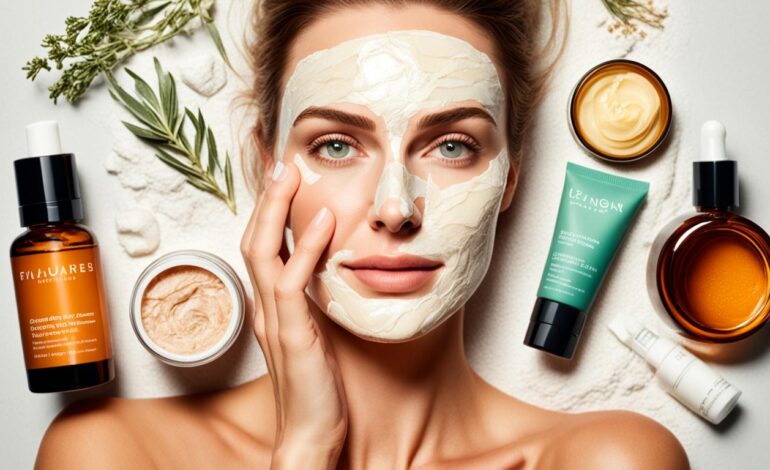
Skin Care Products For Dry skin can be a common concern, especially during colder months or when exposed to environmental factors that cause dehydration. Finding the right skin care products is essential for nourishing and moisturizing dry skin. In this article, we will reveal the best skin care products that are specifically designed for dry skin, providing the necessary hydration and nourishment to keep your skin healthy and supple.
Key Takeaways: Skin Care Products For Dry Skin
- Choosing the right skin care products is crucial for nourishing dry skin and maintaining its moisture levels.
- Dry skin can be caused by environmental factors, such as cold weather and central heating, as well as certain skin conditions.
- A gentle cleanser is important for dry skin to avoid stripping the skin of its natural oils and compromising the skin barrier.
- Hydrating serums with ingredients like hyaluronic acid are beneficial for improving skin hydration and texture.
- Moisturizers with emollient ingredients create a barrier on the skin’s surface to prevent moisture loss and promote hydration.
Understanding the Causes and Effects of Dry Skin
Dry skin occurs when the skin lacks moisture and becomes dehydrated. There are various causes of dry skin, including:
- Cold weather
- Central heating
- Overuse of harsh cleansers
- Certain skin conditions
Dry skin can have several effects, leading to discomfort, tightness, and flaky patches. It can affect the overall appearance and texture of the skin, making it look dull and more prone to irritation. The skin’s natural barrier, which acts as a shield to protect against moisture loss, can become compromised.
Also Read : Best Skin Care Products For Oily Skin Essentials
Environmental factors like cold weather and central heating can strip the skin of its natural oils, depleting its moisture content and contributing to skin dehydration. Overuse of harsh cleansers can disrupt the skin’s pH balance and strip away essential moisture, exacerbating dryness. Certain skin conditions, such as eczema or psoriasis, can also cause dry skin due to abnormal skin cell turnover or impaired skin barrier function.
Also Read : How To Use Vitamin C For Glowing Skin
Understanding the causes and effects of dry skin is crucial in order to effectively address it. By identifying the underlying factors contributing to dryness, you can take appropriate measures to replenish and restore your skin’s hydration levels.
Also Read : 8 Signs Of Unhealthy Skin
| Cause | Effect |
|---|---|
| Cold weather | Dries out the skin and disrupts the skin barrier, causing dryness and tightness. |
| Central heating | Removes moisture from the air, leading to dryness and dehydration of the skin. |
| Overuse of harsh cleansers | Strips away natural oils, disrupts the skin’s pH balance, and compromises the skin barrier, resulting in dry, irritated skin. |
| Certain skin conditions | Impairs the skin barrier function, causing excessive moisture loss and leading to dry, flaky skin. |
By addressing the root causes of dry skin and implementing a suitable skincare routine, you can restore your skin’s hydration levels, improve its appearance and texture, and maintain a healthy skin barrier.
Also Read : The Benefits Of Glycerin In Skin Care
The Importance of a Gentle Cleanser for Dry Skin
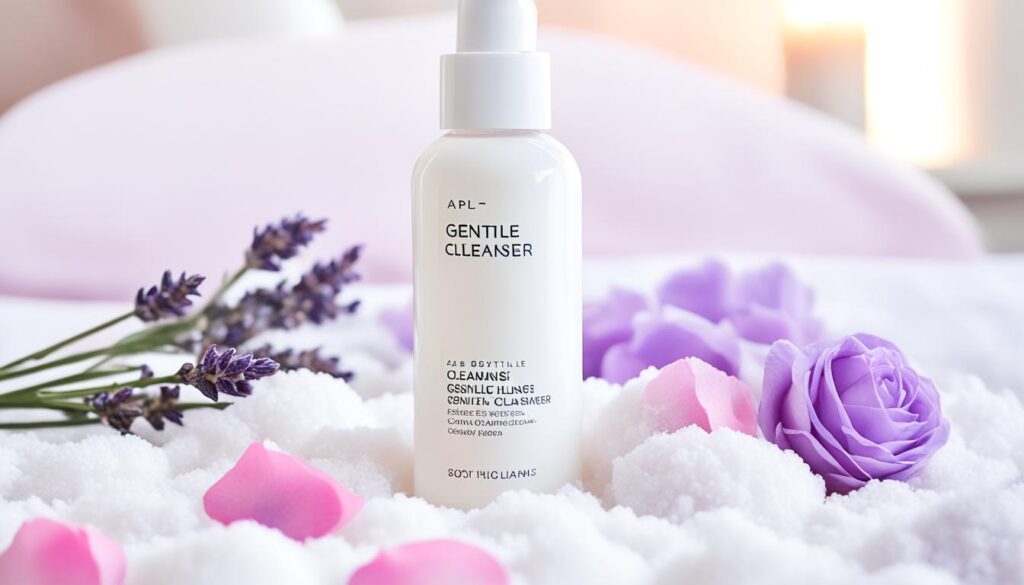
When it comes to caring for dry skin, finding the right cleanser is crucial. A gentle cleanser is specifically designed to effectively cleanse the skin without stripping away its natural oils or compromising the skin barrier. By incorporating a gentle cleanser into your skincare routine, you can maintain the moisture balance of your skin and promote hydration.
Also Read : Skin Care: 7 Tips For Healthy Skin
Dry skin tends to lack moisture and is more prone to irritation and sensitivity. Harsh cleansers can further deplete the skin’s natural hydration levels and disrupt the skin barrier, leading to dryness and discomfort. That’s why it’s important to opt for a cleanser that provides a gentle yet thorough cleanse.
A gentle cleanser helps to remove impurities, dirt, and excess oil from the skin’s surface without causing dryness or irritation. It preserves the skin’s natural oils, which are essential for maintaining hydration and protecting the skin barrier. By using a gentle cleanser, you can cleanse your skin effectively while keeping it nourished and hydrated.
When choosing a gentle cleanser for dry skin, look for products that are specifically formulated for this skin type. These cleansers often contain hydrating ingredients and are free from harsh chemicals and fragrances. Cleansing routines should incorporate a gentle cleanser both morning and night to remove impurities and prepare the skin for subsequent skincare steps.
The Benefits of Using a Gentle Cleanser for Dry Skin
Using a gentle cleanser for dry skin offers several benefits:
- Preserves the skin’s natural oils and moisture
- Helps to maintain the skin barrier function
- Prevents further dryness and irritation
- Allows the skin to retain its natural hydration levels
- Promotes a healthier and more balanced complexion
By incorporating a gentle cleanser into your skincare routine, you can ensure that your dry skin is cleansed effectively without compromising its hydration and barrier function.
Now that we understand the importance of gentle cleansers for dry skin, let’s explore other essential skincare products that can help to hydrate and nourish your skin in the following sections.
Hydrating Serums for Dry Skin
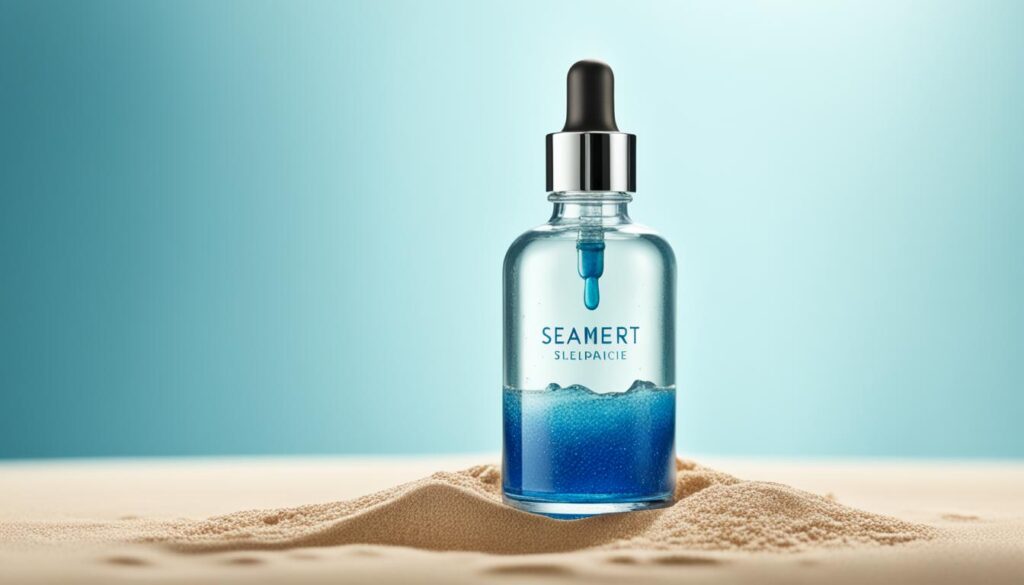
Hydrating serums are a crucial component of any skincare routine for individuals with dry skin. These serums are formulated with humectant ingredients, such as hyaluronic acid, niacinamide, and panthenol, which have the ability to draw and retain moisture within the skin. By incorporating hydrating serums into your skincare regimen, you can provide intense hydration, improve skin texture, and effectively combat dryness.
One of the key ingredients found in hydrating serums is hyaluronic acid. This humectant draws moisture from the environment and helps bind it to the skin, providing long-lasting moisturization. Hyaluronic acid is well-known for its ability to hold up to 1000 times its weight in water, making it highly effective in hydrating and plumping dry skin.
Niacinamide, another common humectant ingredient in hydrating serums, works by improving the skin’s barrier function. It helps to reduce transepidermal water loss, allowing the skin to retain moisture and preventing dryness. Niacinamide also promotes ceramide synthesis, which strengthens the skin barrier and improves overall skin health.
Panthenol, also known as provitamin B5, is often included in hydrating serums for its moisturizing and soothing properties. It helps to improve skin hydration and reduce inflammation, making it an excellent choice for dry, sensitive skin. Panthenol also aids in promoting skin regeneration and maintaining skin elasticity, resulting in improved skin texture and a more youthful appearance.
| Humectant Ingredients | Main Benefits |
|---|---|
| Hyaluronic Acid | Intense hydration, plumping effect |
| Niacinamide | Improves skin barrier, reduces dryness |
| Panthenol | Moisturizing, soothing, improves skin texture |
Incorporating a hydrating serum into your skincare routine can significantly enhance the moisture levels of your dry skin, leaving it nourished, smooth, and revitalized. To reap the full benefits of a hydrating serum, apply a few drops onto cleansed skin and gently pat it in, allowing it to fully absorb before applying other products. Follow with a moisturizer to seal in the hydration and maximize the benefits of your skincare regimen.
With the right hydrating serum and consistent use, you can achieve improved skin texture, enhanced moisturization, and a healthier, glowing complexion for your dry skin.
Choosing the Right Moisturizer for Dry Skin
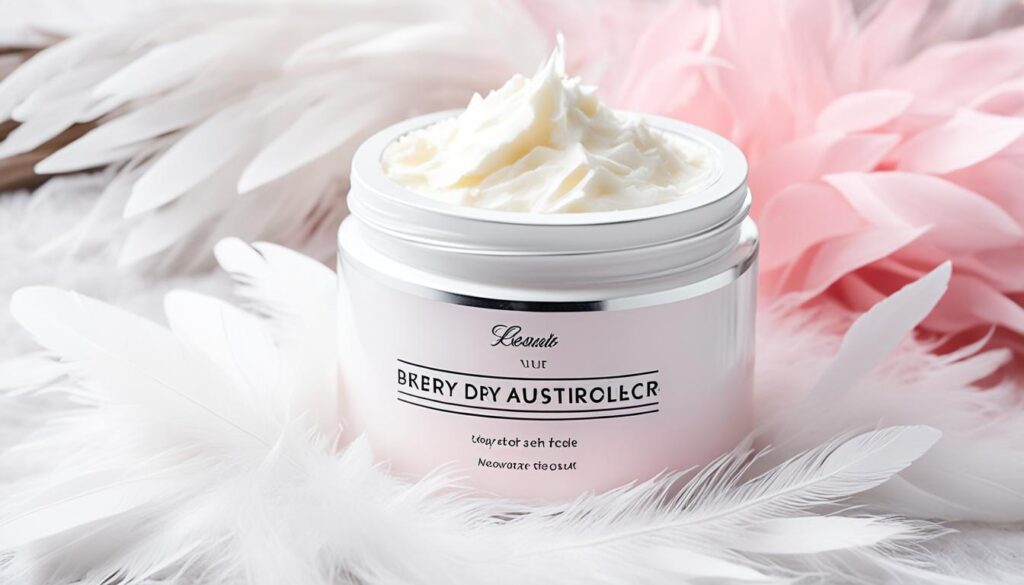
Moisturizers are essential for dry skin as they help replenish lost moisture and create a protective barrier to prevent further water loss. When selecting a moisturizer for dry skin, it’s important to consider emollient ingredients that act as a barrier on the skin’s surface, preventing moisture from escaping. The ideal moisturizer for dry skin should provide intense hydration, nourishment, and help restore the skin’s natural barrier function.
Emollient ingredients in moisturizers play a vital role in hydrating dry skin, retaining moisture, and improving its overall condition. Look for moisturizers that contain ingredients like:
- Shea butter: Known for its deep moisturizing properties, shea butter helps soothe and nourish dry skin, leaving it feeling soft and supple.
- Glycerin: Glycerin is a humectant that attracts moisture to the skin, helping to keep it hydrated and moisturized.
- Hyaluronic acid: This powerful hydrating ingredient can hold up to 1000 times its weight in water, providing intense hydration and plumping the skin.
- Ceramides: Ceramides help strengthen the skin barrier, preventing water loss and keeping the skin moisturized.
When choosing a moisturizer for dry skin, opt for products that are specifically formulated to address dryness and dehydration. Look for labels that mention “for dry skin” or “intense hydration” to ensure they cater to your specific needs. Additionally, consider the texture and consistency of the moisturizer. Creams and lotions are typically more hydrating and suitable for dry skin, providing a richer and more emollient formula.
Remember to apply moisturizer to clean, damp skin to lock in moisture effectively. Massage the moisturizer gently into the skin using upward motions to promote better absorption. Incorporating a moisturizer into your daily skincare routine will help keep your skin hydrated, nourished, and protected, restoring its natural balance.
In addition to moisturizers, there are other ways to support and enhance skin hydration. Hydrating serums can be used alongside moisturizers to provide an extra boost of hydration. These serums are formulated with concentrated ingredients to penetrate deep into the skin, replenishing moisture and improving texture and elasticity. Face masks are another great way to hydrate and nourish dry skin. They deliver a potent dose of hydration and nourishing ingredients in a short amount of time, leaving your skin refreshed and revitalized.
Remember, finding the right moisturizer for your dry skin may require some trial and error. Every individual’s skin is unique, and it’s important to choose a moisturizer that suits your skin’s specific needs and preferences. Consult with a dermatologist or skincare professional for personalized advice and recommendations.
Protecting Your Skin with Sunscreen
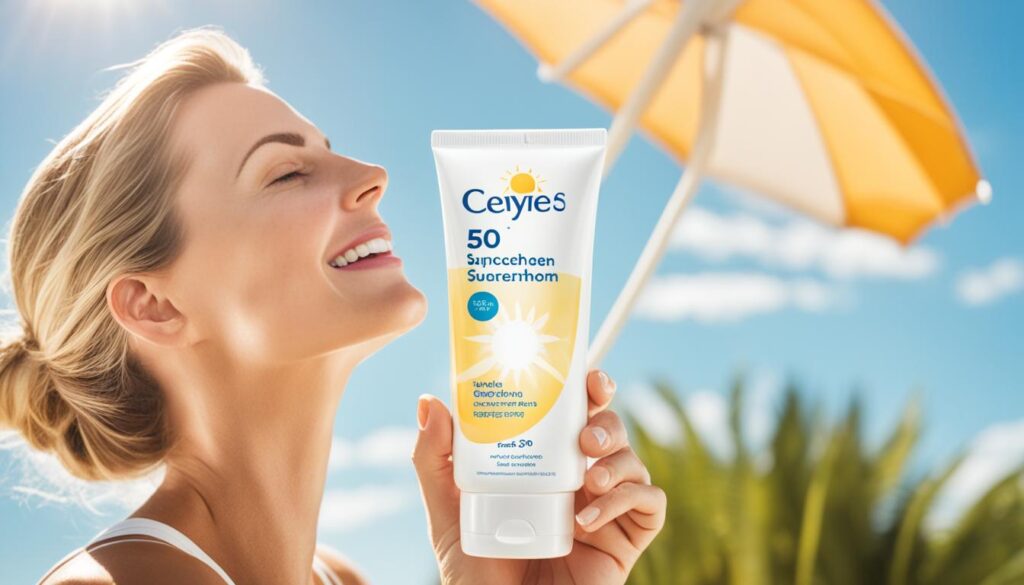
Sunscreen is an essential part of any skincare routine, not only during the summer months but also in the winter. The sun emits harmful UVA and UVB rays that can cause significant damage to the skin, leading to premature aging and an increased risk of skin cancer.
Using a broad-spectrum sunscreen with UVA and UVB protection is crucial to shield your dry skin from these damaging rays. UVA rays penetrate deep into the skin, causing long-term damage such as wrinkles, fine lines, and age spots. UVB rays, on the other hand, are responsible for sunburn and can also contribute to the development of skin cancer.
Applying sunscreen daily is essential to provide adequate sun protection and prevent further damage to your skin. Choose a sunscreen with a high SPF (Sun Protection Factor) of 30 or higher to ensure effective protection against both UVA and UVB rays.
Sunscreen should be applied generously to all exposed areas of the skin, including the face, neck, arms, and legs, at least 15 minutes before sun exposure. Reapply every two hours, or more frequently if you are sweating or swimming.
Remember, the best way to protect your skin from sun damage and reduce the risk of skin cancer is to combine the use of sunscreen with other sun protection measures, such as seeking shade, wearing protective clothing, and using sunglasses.
By prioritizing sun protection and incorporating sunscreen into your daily skincare routine, you can safeguard your skin from harmful UV rays and maintain its health and vitality.
Treating Dry Lips with Protective Lip Balms
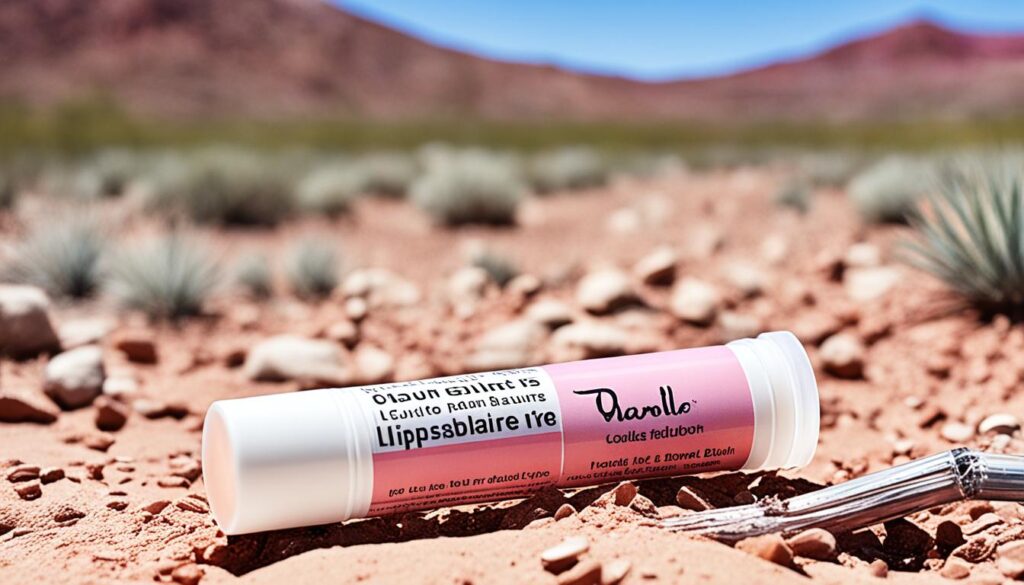
Dry lips can be a common concern, especially during colder seasons. When your lips lack moisture, they can become dry, cracked, and uncomfortable. To keep your lips hydrated and protected, it is essential to incorporate a lip balm into your daily lip care routine.
A lip balm provides intense moisture, effectively hydrating the lips and preventing further dryness. It also forms a protective barrier against environmental factors, such as cold weather and wind, which can further contribute to dryness and damage.
When choosing a lip balm for dry lips, look for products that contain hydrating ingredients. Shea butter, vitamin E, and oils, such as jojoba or coconut oil, are excellent options. These ingredients nourish and soothe the lips, promoting softness and smoothness.
Regularly applying a hydrating lip balm throughout the day is key to maintaining lip hydration. Make sure to apply it before going outdoors and before going to bed to provide maximum protection and moisture to your lips.
Now, let’s take a look at some lip balms that are specifically formulated for dry lips:
| Lip Balm | Key Ingredients | Benefits |
|---|---|---|
| Eos Shea Better Lip Balm | Shea butter, coconut oil, jojoba oil | Nourishes, hydrates, and softens lips |
| Burt’s Bees Beeswax Lip Balm | Beeswax, vitamin E, peppermint oil | Moisturizes and soothes dry, chapped lips |
| Carmex Classic Lip Balm | Petrolatum, camphor, menthol | Provides long-lasting hydration and relieves dryness |
These lip balms are highly effective in treating dry lips and promoting lip health. Remember to choose a lip balm that suits your preferences and needs, and apply it regularly to keep your lips soft, smooth, and moisturized.
Expert Tip:
For an extra hydration boost, exfoliate your lips gently with a lip scrub before applying lip balm. This removes dead skin cells and allows the lip balm to penetrate more effectively, leaving your lips even more nourished and hydrated.
Nourishing Your Hands with Non-Greasy Hand Creams
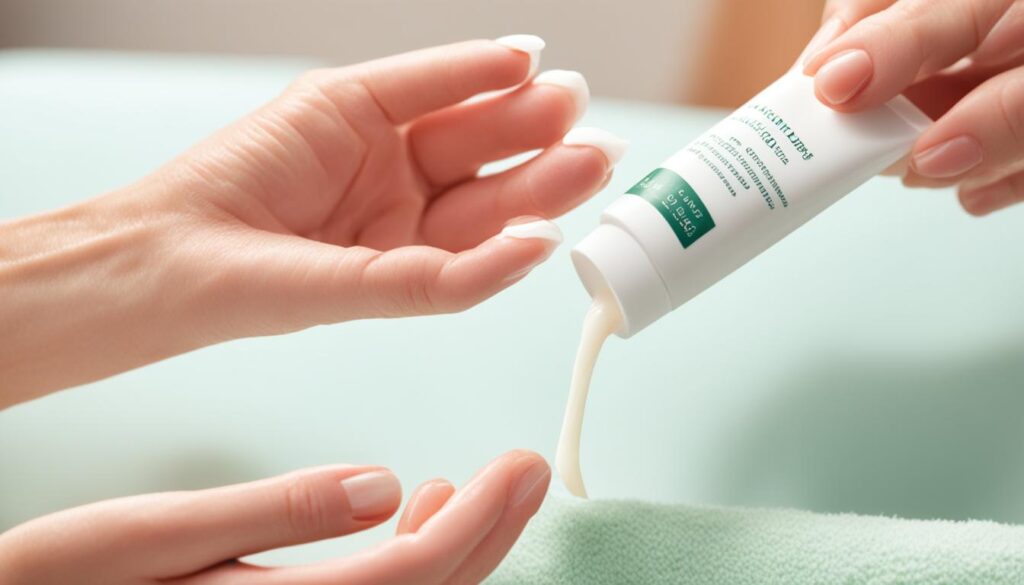
Dry hands can be a common issue, especially during the winter months when the skin is exposed to cold and dry conditions. To combat dryness and maintain healthy hands, it is essential to use a non-greasy hand cream that provides deep hydration and nourishment.
When choosing a hand cream, look for fragrance-free options that contain moisturizing ingredients like shea butter and glycerin. These ingredients help replenish moisture, improve skin elasticity, and protect the skin barrier.
Regular application of a non-greasy hand cream will keep your hands soft, smooth, and protected from further dryness and irritation. Make it a part of your daily hand care routine, especially after washing hands or spending time in cold or harsh environments.
Benefits of Non-Greasy Hand Creams:
- Deeply hydrate dry hands
- Restore the skin’s natural moisture barrier
- Prevent further dryness and irritation
- Improve skin elasticity and texture
- Provide long-lasting nourishment
| Hand Cream | Main Ingredients | Benefits |
|---|---|---|
| Brand A Non-Greasy Hand Cream | Shea butter, glycerin, vitamin E | Deeply hydrates and nourishes dry hands, improves skin elasticity |
| Brand B Hand Cream for Dry Hands | Ceramides, hyaluronic acid | Restores the skin’s natural barrier, locks in moisture for long-lasting hydration |
| Brand C Hydrating Hand Cream | Aloe vera, jojoba oil, chamomile extract | Soothes and calms dry, irritated hands, provides intense hydration |
Investing in a high-quality non-greasy hand cream is an essential step in maintaining healthy and nourished hands. Whether you’re dealing with dryness due to environmental factors or frequent handwashing, a non-greasy hand cream can help restore moisture and protect your skin barrier.
Regular application of a non-greasy hand cream will keep your hands soft, smooth, and protected.
Remember to carry a travel-sized hand cream in your bag or keep one at your desk for easy access throughout the day. Prioritize hand care and give your hands the hydration they deserve.
The Best Skincare Products for Anti-Aging

Aging is a natural process that affects us all, but taking care of your skin can help you maintain a youthful and radiant appearance. Incorporating anti-aging skincare products into your routine is key to combatting the signs of aging and rejuvenating your skin.
One of the most effective ingredients for anti-aging is retinol. Retinol promotes collagen production, which improves skin elasticity and reduces the appearance of fine lines and wrinkles. When choosing anti-aging products, look for serums or creams that contain retinol to enhance skin rejuvenation and improve overall skin texture.
Retinol-based products are known for their powerful anti-aging benefits. They stimulate cell turnover, leading to smoother and more youthful-looking skin. Additionally, retinol helps to even out skin tone and minimize the appearance of age spots.
It’s important to note that retinol can cause skin sensitivity and dryness, especially when first starting to use it. Start with a low concentration and gradually increase as your skin builds tolerance. It’s also crucial to apply sunscreen daily when using retinol, as it can increase sun sensitivity.
Incorporating anti-aging skincare products into your routine can help you maintain a youthful and radiant complexion. Whether you choose a retinol-based serum or cream, the key is to be consistent with your application and give your skin time to reap the benefits.
Targeting Inflammation with Skincare Products
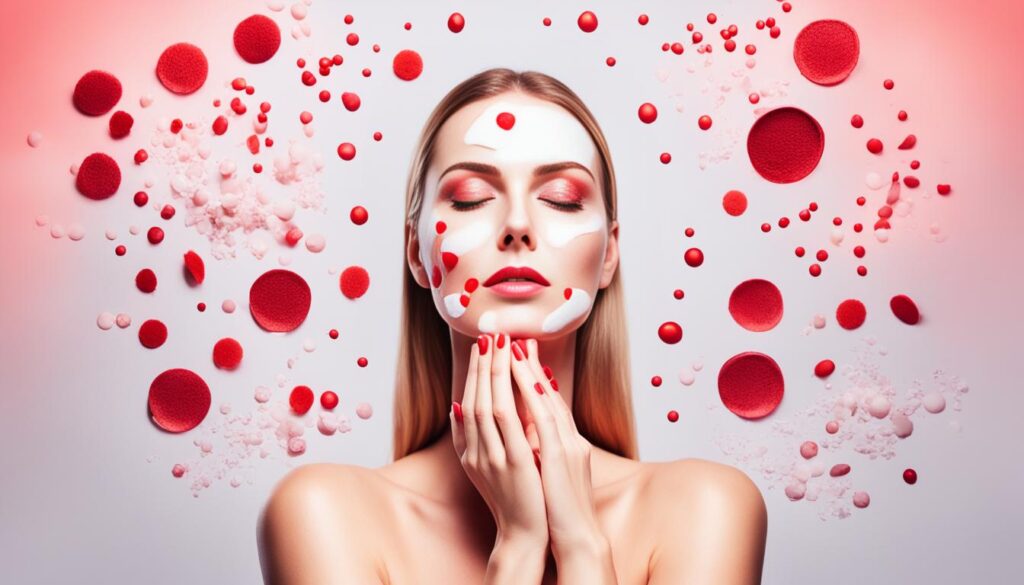
Inflammation can disrupt the skin barrier and lead to various skin issues, including dryness, redness, and irritation. It’s important to address inflammation by using skincare products specifically designed to soothe and repair the skin. These products contain botanicals, antioxidants, and soothing ingredients that calm inflammation and restore the skin’s barrier function.
Skincare products that target inflammation help:
- Reduce redness and irritation
- Soothe and calm inflamed skin
- Restore the skin’s natural balance
- Strengthen the skin barrier
When looking for skincare products to target inflammation, keep an eye out for ingredients like:
- Botanicals: Plant-based extracts, such as chamomile, aloe vera, and green tea, have anti-inflammatory properties that help soothe and heal the skin.
- Antioxidants: Antioxidants, like vitamin C and vitamin E, protect the skin from free radicals and reduce inflammation caused by environmental stressors.
- Soothing ingredients: Ingredients like oat extract, allantoin, and panthenol provide a soothing and calming effect on inflamed skin.
It’s essential to choose skincare products that are gentle and suitable for sensitive, inflamed skin. Avoid harsh ingredients or products that may further irritate the skin. Instead, opt for products that are specially formulated to target inflammation and provide relief for your skin.
To better understand how skincare products can target inflammation and improve overall skin health, consider the following quote:
“Using skincare products that contain botanicals, antioxidants, and soothing ingredients can effectively reduce inflammation and restore the skin’s barrier function, leading to healthier and more balanced skin.” – Dr. Sarah Johnson, Dermatologist
Benefits of using skincare products that target inflammation:
| Benefits | Description |
|---|---|
| Reduces redness and irritation | Calms inflammation and soothes irritated skin, resulting in a more even complexion. |
| Restores skin barrier function | Strengthens the skin’s protective barrier, helping to prevent moisture loss and maintain hydration. |
| Improves skin texture | Smooths out rough patches and uneven skin texture caused by inflammation. |
| Soothes discomfort | Eases skin discomfort, such as itching and tightness, associated with inflammation. |
By incorporating skincare products that specifically target inflammation into your routine, you can effectively soothe and heal your skin, restoring its natural balance and promoting a healthier, more radiant complexion.
Addressing Redness with Specialized Skincare Products
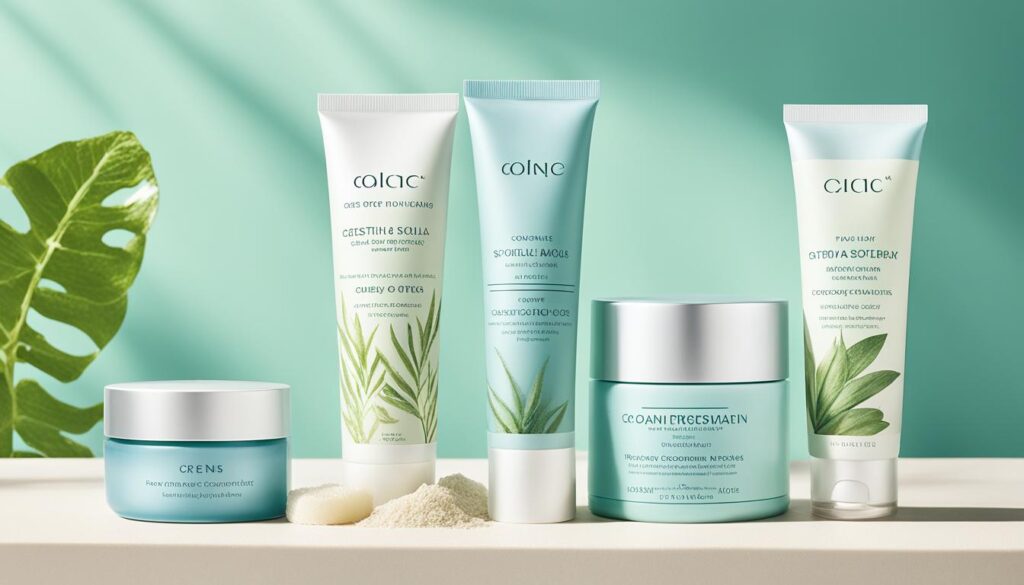
Redness is a common concern for those with sensitive skin or skin conditions like rosacea. It can be frustrating and impact self-confidence. However, using specialized skincare products can help address redness and alleviate skin sensitivity.
When looking for skincare products to target redness, it’s important to choose ones specifically formulated for sensitive skin. These products often contain calming ingredients that help reduce redness and strengthen the skin’s barrier, promoting a more even-toned complexion.
Key Ingredients for Redness-Reducing Skincare Products
When shopping for redness-reducing skincare products, keep an eye out for the following key ingredients:
- Niacinamide: This vitamin B3 derivative has anti-inflammatory properties and helps reduce redness and blotchiness.
- Peptides: Peptides are small chains of amino acids that can help strengthen the skin’s barrier and improve skin texture, resulting in reduced redness.
- Botanical Extracts: Certain botanical extracts, such as chamomile and aloe vera, have soothing properties that can calm redness and inflammation.
By incorporating skincare products containing these key ingredients into your routine, you can effectively address redness and promote a more balanced complexion.
Note: Remember to perform a patch test before incorporating new products into your skincare routine, especially if you have sensitive skin.
To give you a better idea of the types of specialized skincare products available for addressing redness, here are a few recommendations:
| Product | Description |
|---|---|
| Rosacea Relief Cream | A calming cream formulated specifically for rosacea-prone skin, designed to reduce redness and soothe irritation. |
| Sensitive Skin Serum | A lightweight serum that contains niacinamide and botanical extracts to calm redness, reduce inflammation, and strengthen the skin’s barrier. |
| Barrier Repair Moisturizer | A moisturizer infused with peptides and hydrating ingredients to repair the skin’s barrier, alleviate redness, and provide long-lasting hydration. |
When using these specialized products, it’s important to follow the instructions provided by the manufacturer and incorporate them into your skincare routine consistently to achieve the best results. Everyone’s skin is unique, so it may take some experimentation to find the right combination of products that work for you.
Remember, addressing redness requires a comprehensive approach that includes using gentle cleansers, hydrating serums, and moisturizers formulated for sensitive skin. It’s also essential to protect your skin from sun damage by using a broad-spectrum sunscreen.
With the right skincare products and a consistent routine, you can effectively address redness and achieve a more balanced, calm complexion.
Skincare for dry skin on face & body
Conclusion
Building a skin care routine tailored to dry skin is crucial for maintaining healthy and hydrated skin. By incorporating gentle cleansers, hydrating serums, moisturizers, sunscreen, and specialized products for specific concerns like redness and inflammation, you can effectively address dry skin concerns. It’s important to choose products that provide intense hydration, nourishment, and protection for dry skin.
For a well-rounded skin care routine, start with a gentle cleanser that won’t strip away your skin’s natural oils. Follow with a hydrating serum that contains ingredients like hyaluronic acid and niacinamide to boost moisture levels and improve skin texture. Applying a moisturizer with emollient ingredients will help replenish lost moisture and restore your skin’s natural barrier function.
Don’t forget to protect your skin from the damaging effects of the sun by applying a broad-spectrum sunscreen daily. Sunscreen not only helps prevent premature aging but also reduces the risk of skin cancer. Additionally, address specific concerns like dry lips with a hydrating lip balm and dry hands with a non-greasy hand cream. These products will provide the necessary hydration and protection to keep your skin healthy and nourished.
Remember, consistency is key in any skin care routine. Listen to your skin’s needs and adjust your routine as necessary. With the right products and a proper routine, you can achieve healthy, hydrated, and glowing skin.
FAQs
Q: What are the best skin care products for dry skin?
A: The best products for dry skin usually include hydrating ingredients like hyaluronic acid, glycerin, and ceramides. Look for face moisturizers, lotions, and creams specifically designed for dry skin.
Q: How important is a face moisturizer for dry skin?
A: A face moisturizer is crucial for dry skin as it helps nourish and hydrate the skin, restoring its moisture balance. Opt for a rich and hydrating face cream to alleviate dryness and prevent flakiness.
Q: What is the significance of a skin care routine for dry skin?
A: A dedicated skincare routine for dry skin is essential to maintain skin health and hydration levels. It involves using gentle cleansers, hydrating serums, moisturizers, and possibly treatments to address specific skin concerns.
Q: How can one identify signs of dry skin?
A: Signs of dry skin often include tightness, flakiness, rough patches, itching, and redness. If your skin feels tight after washing or appears dull and lacks elasticity, it may indicate dryness.
Q: Can people with dry skin also have acne-prone or sensitive skin?
A: Yes, individuals with dry skin can also have acne-prone or sensitive skin. It’s essential to choose products specifically formulated for dry and sensitive skin types to avoid exacerbating existing skin issues.
Q: What should I look for in a face moisturizer for dry skin?
A: When selecting a face moisturizer for dry skin, opt for products with hydrating ingredients like shea butter, squalane, and natural oils. Avoid products with harsh ingredients that can further dry out the skin.
Q: How can I care for dry, aging skin?
A: To care for dry, aging skin, incorporate anti-aging products like retinol and vitamin C serums into your skincare routine. These ingredients help in reducing fine lines and wrinkles while providing hydration to dry skin.
